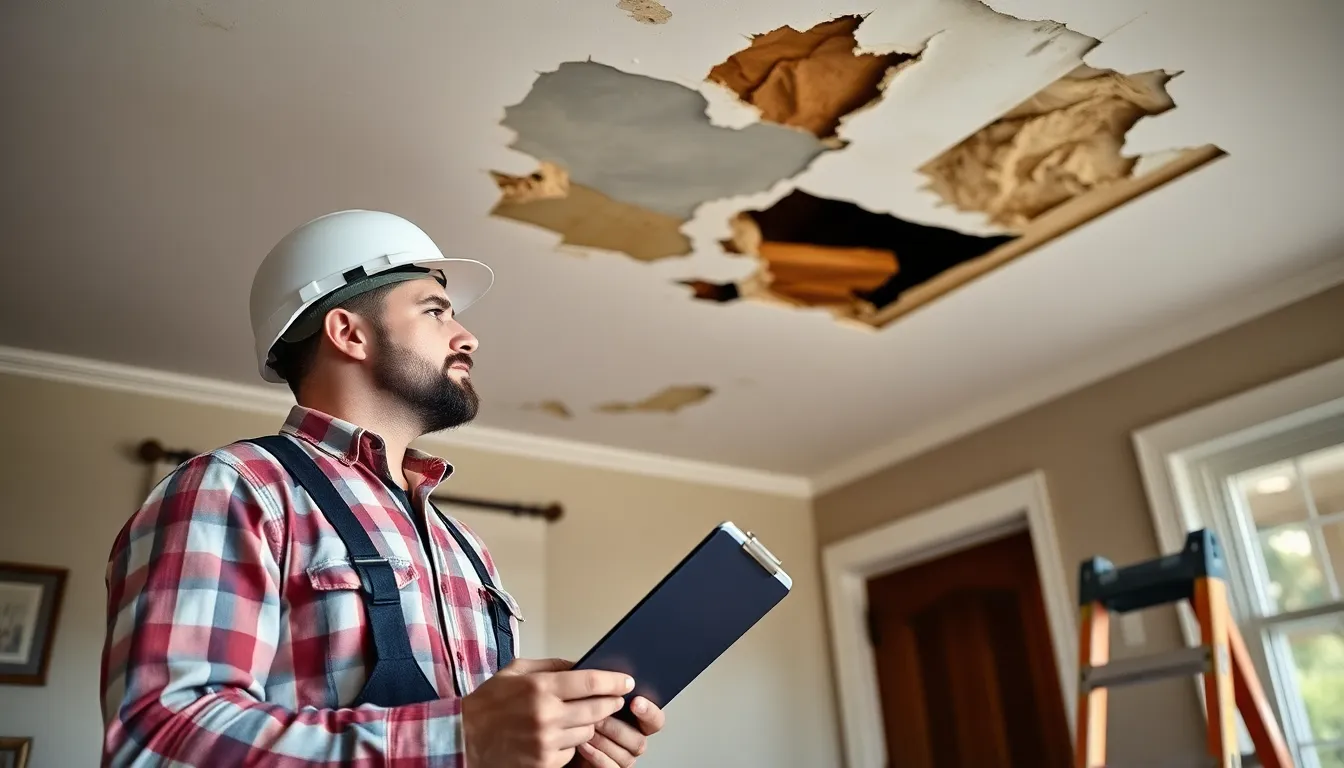Ceilings: the unsung heroes of our homes, quietly holding everything together while we go about our lives. But when they start to sag, crack, or leak, they can turn from a dependable friend into an expensive nightmare. Suddenly, that charming popcorn texture feels more like a popcorn disaster!
Table of Contents
ToggleUnderstanding Ceiling Repair Cost
Ceiling repair costs vary based on several factors. Homeowners often encounter different expenses depending on the nature of the damage.
Factors Affecting Repair Cost
Location influences repair costs significantly. Urban areas usually reflect higher labor rates and material costs compared to rural locations. Severity of damage plays a key role as well. Minor cracks may need simple patching, while extensive water damage requires complete replacement. Type of ceiling also matters. Different materials, such as drywall or plaster, incur varying repair costs. Additional factors include accessibility and labor requirements. If scaffolding or special equipment is necessary, expenses can increase. Estimating a typical range for ceiling repair falls between $300 and $1,500.
Types of Ceiling Damage
Physical damage can manifest in different forms. Cracks often appear from settling or temperature changes. Sagging occurs due to structural issues or excessive weight. Water damage from leaks leads to stains or mold growth, requiring immediate attention. Popping or popping noises may signify the underlying structure is compromised. Each type of damage demands specific repair techniques. Dealing with structural issues commonly involves consulting a professional for assessment. Regular inspections help identify issues early, preventing extensive repair costs later.
Average Ceiling Repair Costs

Ceiling repair costs vary significantly based on several factors. Understanding these costs provides clarity for homeowners.
Cost by Ceiling Type
Costs differ depending on the type of ceiling being repaired. For example, drywall repairs typically range from $300 to $800 for minor damage. Popcorn ceilings might incur higher repair expenses, often between $500 and $1,200. Wood ceilings generally demand about $700 to $1,500 for substantial repairs due to labor and material needs. Regardless of ceiling type, the severity of the damage impacts the overall cost.
Regional Cost Differences
Regional variations influence ceiling repair expenses. In metropolitan areas, costs tend to be higher; for instance, repairs may reach $1,000 or more. Rural locations often exhibit lower price ranges, with common repairs averaging around $400. Labor rates can vary as well, with rates in the Northeast typically exceeding the national average. Cost also fluctuates based on the availability of skilled contractors in a given area.
DIY vs. Hiring Professionals
Deciding between DIY repairs and hiring professionals involves weighing several factors.
Pros and Cons of DIY Repairs
DIY repairs can save money on labor costs. Many homeowners find satisfaction in completing projects themselves. Materials for minor repairs often cost less than $100. However, the risk of inadequate repairs exists, potentially leading to further issues. Lack of expertise may result in improper techniques, complicating future repairs. Time commitment varies, with some projects absorbing entire weekends. For simple tasks like patching a small crack, DIY is manageable. Serious problems, however, require skill and experience, making DIY less advisable.
When to Hire a Professional
Hiring a professional often ensures quality and durability. Professionals possess the experience to address significant damage correctly. For extensive repairs, such as major ceiling replacements, involving an expert mitigates risk. Homeowners gain peace of mind with warranties and guarantees. Average labor costs fluctuate, typically ranging from $50 to $150 per hour, depending on location. It’s crucial to hire professionals for complex problems, like water damage or structural issues. Inspections and assessments by experts can reveal underlying concerns that might go unnoticed otherwise.
Additional Costs to Consider
Ceiling repair expenses extend beyond basic repairs. Several additional cost factors can influence the overall budget.
Material Costs
Material costs play a crucial role in ceiling repairs. Typical expenses for sheetrock and joint compound range from $20 to $50 per sheet, depending on thickness. Choosing between different ceiling types impacts costs significantly. For instance, popcorn ceiling materials may amount to $50 to $100 per gallon. Wood ceiling materials, known for their aesthetic appeal, usually range from $1 to $3 per square foot. Homeowners must consider the price of paint, sealants, and other supplies, which can collectively add another $100 to $300. Understanding these material costs aids in accurate budget planning.
Labor Costs
Labor costs vary based on multiple factors. Professionals typically charge between $50 and $150 per hour for their services. Complexity of the repair largely dictates labor time estimates. Minor patching jobs might take only a couple of hours, while extensive repairs could require several days of skilled labor. Geographic location also affects rates, with urban areas often incurring higher labor costs than rural regions. Furthermore, hiring specialized contractors for specific ceiling types can influence hourly pricing. Factoring in these labor costs helps ensure a comprehensive budgeting approach.
Ceiling repair costs can vary widely based on several factors including the type of damage and location. Homeowners should be proactive in addressing issues to avoid escalating expenses. Regular inspections can help catch minor problems before they become major headaches.
Deciding between DIY repairs and hiring professionals requires careful consideration of the risks and benefits. While DIY might save money upfront, professional help often ensures a higher quality repair and long-term durability. Understanding the full scope of potential costs including materials and labor is crucial for effective budgeting. By being informed and prepared, homeowners can maintain the integrity of their ceilings without breaking the bank.





